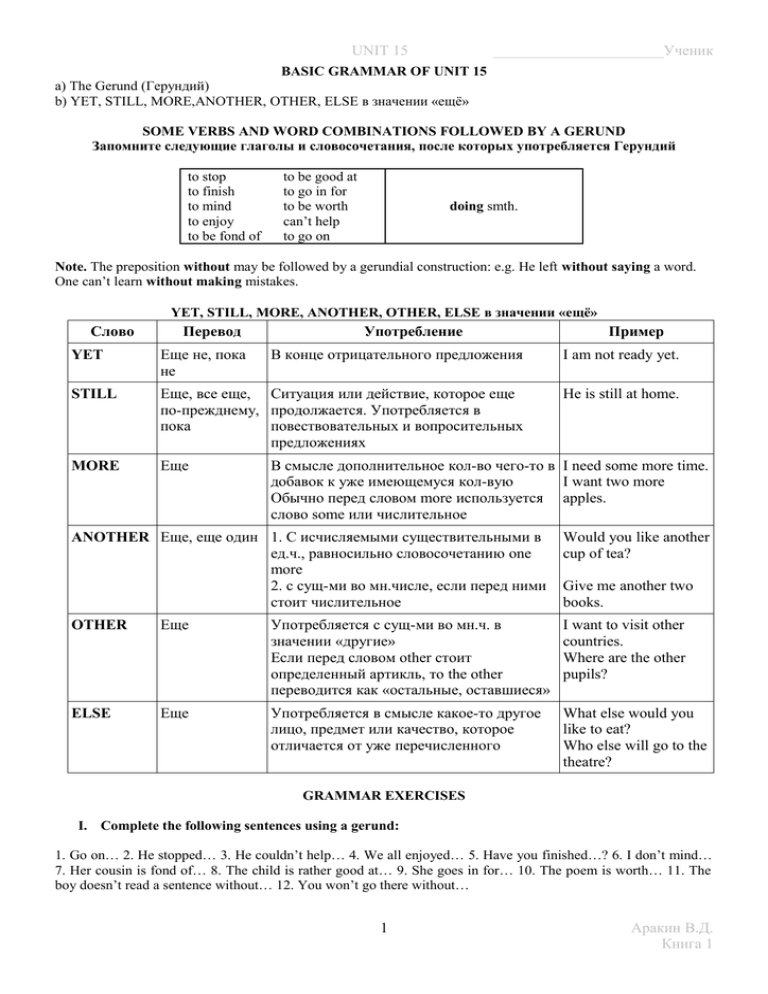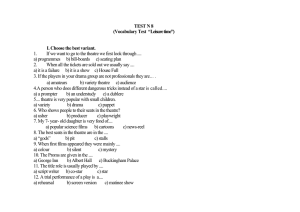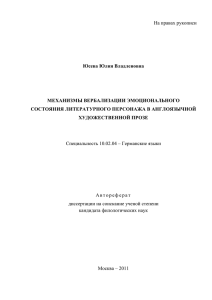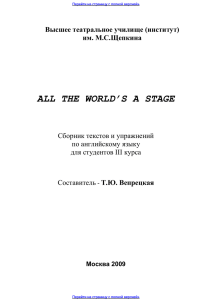TEXT 1
реклама

UNIT 15 ______________________Ученик BASIC GRAMMAR OF UNIT 15 a) The Gerund (Герундий) b) YET, STILL, MORE,ANOTHER, OTHER, ELSE в значении «ещё» SOME VERBS AND WORD COMBINATIONS FOLLOWED BY A GERUND Запомните следующие глаголы и словосочетания, после которых употребляется Герундий to stop to finish to mind to enjoy to be fond of to be good at to go in for to be worth can’t help to go on doing smth. Note. The preposition without may be followed by a gerundial construction: e.g. He left without saying a word. One can’t learn without making mistakes. YET, STILL, MORE, ANOTHER, OTHER, ELSE в значении «ещё» Слово Перевод Употребление Пример YET Еще не, пока не В конце отрицательного предложения I am not ready yet. STILL Еще, все еще, Ситуация или действие, которое еще по-прежднему, продолжается. Употребляется в пока повествовательных и вопросительных предложениях He is still at home. MORE Еще В смысле дополнительное кол-во чего-то в I need some more time. добавок к уже имеющемуся кол-вую I want two more Обычно перед словом more используется apples. слово some или числительное ANOTHER Еще, еще один 1. С исчисляемыми существительными в ед.ч., равносильно словосочетанию one more 2. с сущ-ми во мн.числе, если перед ними стоит числительное Would you like another cup of tea? OTHER Еще Употребляется с сущ-ми во мн.ч. в значении «другие» Если перед словом other стоит определенный артикль, то the other переводится как «остальные, оставшиеся» I want to visit other countries. Where are the other pupils? ELSE Еще Употребляется в смысле какое-то другое лицо, предмет или качество, которое отличается от уже перечисленного What else would you like to eat? Who else will go to the theatre? Give me another two books. GRAMMAR EXERCISES I. Complete the following sentences using a gerund: 1. Go on… 2. He stopped… 3. He couldn’t help… 4. We all enjoyed… 5. Have you finished…? 6. I don’t mind… 7. Her cousin is fond of… 8. The child is rather good at… 9. She goes in for… 10. The poem is worth… 11. The boy doesn’t read a sentence without… 12. You won’t go there without… 1 Аракин В.Д. Книга 1 UNIT 15 ______________________Ученик II. Translate the following sentences into English: 1. Прекратите разговаривать (смеяться, писать, ссориться). 2. Мать велела детям закончить игру (пение, вязание, шитье, глажение). 3. Продолжайте петь (работать над этим текстом, переводить эту статью, писать, изучать эту проблему). 4. Вы не против того, чтобы открыть окно (собраться в субботу, пойти туда вместе, повторить это упражнение)? 5. Я очень люблю рисование (игру в теннис, пение в хоре, чтение вслух). 6. Мы получим удовольствие от ее пения (от плавания, от беседы с ним, от катания на лыжах в лесу). 7. Я не могла не согласиться с ним (не подождать ее, не ответить на его вопрос). 8. Стоит посмотреть эту пьесу (посетить этот музей, сделать эти упражнения устно). 9. Он ушел из комнаты, не сказав ни слова (не глядя ни на кого, не взяв ничего с собой, не попрощавшись). 10. Ее дочери увлекаются вязанием (катанием на коньках, танцами). TEXT 1 JEAN’S FIRST VISIT TO THE THEATRE When I invited Jean to the theatre I was afraid she would refuse my invitation, but she had accepted it. I still doubted whether she would come: her religion did not allow to go to a theatre, play cards or love a man of other religious views. However, when I met her at the entrance to the theatre I saw she had thrown off her religious scruples. She looked eager and her dark eyes sparkled with excitement. Our seats were in the pit. They were not expensive, but we could see the stage quite well. I gave her the programme and my opera glasses. Presently the lights went down; then the curtain rose upon a scene of eighteenth-century Paris at the time of the French Revolution. It was a melodrama full of hopeless love and heroic self-sacrifice, a play after Dickens’s novel “A Take of Two Cities” When Martin Harvey, a famous actor, who played the leading part of Sydney Carton appeared on the stage, Jean’s eyes were full of interest and delight. She was greatly impressed by pale, dark Carton and delicate, charming Lucie Manette, the girl he loved. During the interval Jean said “Oh, Mr. Shannon, how splendid it is! So different from what I expected! I can’t tell you what a treat it is for me! I feel so sorry for poor Sydney Carton! He is so much in love with Lucie and she… It must be a frightful thing to be in love and not to be loved!” “Quite,” I agreed gravely. “At least they are good friends, and friendship is a wonderful thing.” She consulted her programme to conceal her flush. “The girl who does Lucie is very sweet, she has such lovely, blonde hair and is so young!” “Well, in real life she is Martin Harvey’s wife, must be about forty-five, and that blond hair is a wig”. “Please, don’t, Mr. Shannon! How can you joke about such things?” she cried in a shocked voice… At the last scene was under way Jean’s hand, small and hot, touched mine. We sat hand in hand as though support each other while watching Carton with a pale face and carefully arranged hair mount the guillotine and meet his death. Jean couldn’t keep her tears and they fell upon the back of my hand like raindrops in spring. When at last the play came to its end there was a storm of applause and many curtain calls for Miss de Silva and Martin Harvey. Miss Jean Law, however, was too overcome to join in such a banal applause, her feelings were too deep for words. Only when we were in the street she whispered with shining eyes. “Oh, Robert, you can’t believe me how much I’ve enjoyed myself!” It was the first time she had used my Christian name. (After “Shannon’s Way” by A. Cronin) TEXT 2 A TELEPHONE CONVERSATION (Nick dials the number. Helen answers the call.) Helen: Hullo! Nick: Thank God, is that you, Helen? Helen: Sure, that’s me, Nick, darling. You sound a bit annoyed. Is anything the matter? Nick: Well, I’ve been trying to get connected with you for nearly ten minutes and… Helen: But what’s wrong? The line wasn’t engaged, I hope? Nick: Yes, it was. Besides, I got the wrong number several times… Helen: Oh, Nick, I’m so sorry! Nick: That’s all right now. I say, Helen, have you got anything special on tonight? Helen: No, not really. Why? Nick: I suggest our going to the theatre. 2 Аракин В.Д. Книга 1 UNIT 15 ______________________Ученик Helen: I’d love to. What are we going to see? Nick: I’ve got two tickets for “Lady Windermere’s Fan” by Oscar Wilde. It’s the first night. Helen: Oh, it’s at the Maly Theatre, isn’t it? Nick: I have heard the play is worth seeing. It is staged very well. The scenery is simple but good and the acting is splendid. Helen: And what about the seats? I hope they are not in the balcony or in the gallery? Nick: Oh, dear, no. They are in the dress-circle, box 5. Helen: Let’s hope we’ll enjoy ourselves. Will you call for me or shall we meet at the theatre? Nick: I’d rather call for you. I don’t like waiting and you take such a long time to get ready. Helen: So I do. But I love to look smart when I go to the theatre. Nick: All right, then. I’ll call for you at 5:30, so we’ll have plenty of time to get to the theatre before the performance starts. Helen: That suits me perfectly. I’ll be waiting for you. And, oh, Nick! Thank you ever so much for your invitation. Nick: That’s all right, dear. See you tonight. Helen: Bye-bye! VOCABULARY NOTES refuse – отказывать(ся), Ant. accept, e.g. Irene refused Soames several times before she accepted him. refusal – отказ accept – принимать, to accept a present (invitation, offer, help, plan), but to receive guests (visitors) doubt – сомневаться, e.g. We doubted whether he would follow your advice. doubt – сомнение, e.g. There is no doubt he tells the truth. excite – возбуждать, волновать, e.g. The performance excited Jean so greatly that she could hardly speak., excited - взволнованный, to be (look, feel) excited, excitement – волнение seat – место в театре, in the stalls – в партере, in the orchestra stalls – в первых рядах партера, in the pit – в амфитеатре, in the dress-circle – в бельэтаже, in the upper circle – в первом ярусе, Syn. in the balcony – на балконе, in a box – в ложе, in the gallery – на галерке. stage – сцена, e.g. When the singer came onto the stage there was a storm of applause. to stage – ставить (пьесу, спектакль), e.g. This play was staged by K.S. Stanislavsky. Program(me) , to be on the programme –в программе, e.g. My favourite songs were on the programme the lights went down – огни погасли to rise (rose, risen) 1. подниматься, подняться, e.g. He slowly rose to his feet, 2. взойти (о солнце), e.g. When the sun rose, we started off. Note: raise – поднять, to raise one’s head (hat, voice, etc.) e.g. At seeing Fleur he raised his hat. Syn. put up, e.g. If you want to ask a question, put up your hand scene – сцена, картина (о пьесе), e.g. I like the final (last) scene in that ballet, scenery (used only in singular) – декорации, e.g. The scenery was beautiful. The scene is laid in Paris. act – акт, действие, e.g. I like the second act of “Swan Lake” most of all., actor, actress –актер, актриса, as a great (famous, popular, talented, favourite) actor, to act – действовать, e.g. He had to act at once. There was no time to lose., active –активный, an active person (support, part, etc.) Our students take an active part in school life., Ant. passive to play the part of –играть роль leading – ведущий, главный delight –восторг charming – очаровательный, e.g. The doctor was a charming young woman. charm – We were all charmed by her manners. His short stories have a charm of style that can not be found in any writers. to be in love with smb. – быть влюбленным в кого-либо, e.g. Fleur was in love with Jon. to fall in love with smb. (at first sight) – влюбиться в кого-либо (с первого взгляда) touch – трогать, касаться, волновать, e.g. Her story touched the listeners., touch – прикосновение, touching – трогательный, e.g. We were excited by this touching scene. support - поддерживать, e.g. Michael helped his father to support their family., support – поддержка, e.g. I need your friendly support. carefully - аккуратно, тщательно, осторожно, e.g. He took the baby carefully in his arms., care – уход, забота, e.g. The car needs constant care., to take care of – ухаживать за…, присматривать, e.g. He took care of the flowers in the garden., Syn. to look after, care (for smb.) – питать интерес, любить, e.g. I don’t care much for fish. I don’t care! Мне всё равно!, careful – 1. осторожный, e.g. I will be careful with your books., be careful 3 Аракин В.Д. Книга 1 UNIT 15 ______________________Ученик not to… смотри не… e.g. Be careful not to lose the tickets. 2. Тщательный as careful work (preparation, examination); careless – 1. небрежный, as careless person (work, attitude); 2. беззаботный as careless little singing birds. death – смерть, Ant. life, e.g. After his parents’ death little Shannon was brought up by his grandparents. die –e.g. Her father died when the girl was twelve. dead – e.g. When the doctor came the old man was already dead. applause – аплодисменты, a storm of applause – буря аплодисментов, e.g. There was a storm of applause when the curtain rose. The scenery was wonderful indeed. applaud – e.g. As soon as we saw the famous actor we began to applaud to him. curtain call – вызов актера на сцену ticket – билет, as a ticket to the theatre (cinema), a ticket for a play (performance, etc.) the first night – премьера the play is worth seeing – пьесу стоит посмотреть to call for somebody – зайти за кем-л., e.g. I’ll call for you and we shall go there together., to call on smb. – зайти к кому-л., e.g. Last night I called on Ann. She is ill as you know. That suits me perfectly. – это меня очень устраивает. TOPICAL VOCABULARY opera, drama, comedy, variety show, concert, symphony music, ballet, circus, intermission, matinee concert hall, conservatoire, theatre composer, conductor, musician, artist, prompter, singer, attendant cloak-room, refreshment-room, rehearsal (dress rehearsal), buffet opera-glasses, program 4 Аракин В.Д. Книга 1 UNIT 15 ______________________Ученик EXERCISES I. Answer the following questions to the text 1: 1. What did Jean look like when Robert met her at the theatre? 2. Where were their seats? 3. Upon what scene did the curtain rise? 4. What kind of play was it? 5. Who(m) was Jean greatly impressed by? 6. What did Robert say about the leading actress? 7. What showed that Jean was deeply touched by what was going on on the stage? 8. Why didn’t Jean join in applause? 9. What showed that the performance was a success? 10. Jean had always used Shannon’s Christian name, hadn’t she? II. Chose the correct word: to rise – to raise 1. He…his head when he heard a slight noise. 2. When we started the sun had already…. 3. There was a storm of applause when the curtain… 4. He…his hat to greet us. 5. Ann slowly…to her feet. 6. It was very noisy and the reporter had to …his voice. 7. The curtain wouldn’t …and we had to…it. stage – scene 1. The …was so touching that Jean began to cry. 2. Carrie was told to come onto the…in the second act. 3. The play consists of two acts and four….4. When the actor appeared on the…the audience began to applaud. 5. I don’t quite like the final…in this play. 6. Our seats were in the orchestra stalls and we saw the…well. III. Fill in the missing words: 1. Jean looked…when she came to the theatre (взволнованный). 2. I …the invitation with joy (принимать). 3. The play consists of 3…(акт, картина). 4. He…our help and said he could do everything himself (отказываться). 5. When the…rose and the audience saw the…everybody began to… (занавес, декорации, аплодировать). 6. When Alison appeared on the…she was… (сцена, взволнованный). 7. Our…were in the…and we could see the ….very well without the… (места, ложа, сцена, бинокль). 8. The play made such an…upon me that I would never forget it (впечатление). 9. I never expected that you would…our suggestion (поддерживать). 10. We made up our minds to…a party in English (устраивать). 11. I don’t remember the name of the …who played the …part in the play (актер, главный). 12. Seats in the boxes and in the stalls are…and seats in the gallery are…(дорогой, дешевый). 13. She said she was telling the truth, but we…her words (сомневаться). IV. Fill in prepositions or adverbs wherever necessary: 1. We enjoyed …the performance greatly. 2. He decided to reserve a seat…phone. 3. It’s rather easy to get tickets…this theatre, but it is difficult to get tickets…this play. 4. She refused…our help. 5. She took care…her little brother. 6. Will you go to the football match tomorrow? – No, I don’t care…football. 7. …my way…the theatre I met a friend of mine. 8. I don’t like seats…the balcony or…the gallery, I prefer them…the stalls or…the dress-circle. 9. The scene is laid…Verona. 10. This is a play…Dickens’ novel. 11. I’m so sorry…Ann. She has fallen ill. 12. Fleur Forsyte fell…love…Jon…first sight. 13. The attendant will show you…your seats. 14. There is no doubt…it. 15. When the lights wend…and the curtain rose there was a storm…applause. V. Fill in articles wherever necessary: 1. …theatres are very much…same in London as anywhere else; …main theatres, music-halls and cinemas as in… West End. If you are staying in London for…few days, you will have no difficulty whatever in finding somewhere to spend…evening. You will find …opera,…comedy,…drama,…variety,…cinema performances start at about eight or…half past, and finish about eleven. …best seats are those in…stalls, in …dress-circle and …upper circle. Then comes…pit and …last of all…gallery. …boxes, of course, are more expensive. …most theatres and music-halls have …good orchestras with …popular conductors. The opera house is at Covent Garden. There you get…best celebrated conductors. But, of course, if you are not fond of…music, this won’t interest you. At…West End theatres you can see…most of…famous English actors and actresses. …plays are staged well. Choose good play, and you’ll enjoy yourself from…moment…curtain goes up, to…end of…last act. Get your seat beforehand either at…box-office of…theatre itself or at one of…agencies. 5 Аракин В.Д. Книга 1 UNIT 15 ______________________Ученик VI. Change the following sentences according to the models: Model 1: I like to read plays. – I enjoy reading plays. 1. We like to play chess. 2. My elder sister likes to sing folk songs. 3. They like to ski in the forest on a sunny frosty day. 4. The children like to bathe and splash the water all around. 5. They also like to lie in the sun. Model 2: He is excited. He can not speak. – He is very excited and can hardly speak. 1. Our seats were far from the stage. We could not see well what was going on. 2. The scene was touching. Jean couldn’t hide her tears. 3. It was very noisy in the hall. We didn’t hear the speaker well. 4. Her lips trembled. She spoke with difficulty. 5. The news is so exciting. I cannot believe it. 6. The child is so active. He cannot sit still for a minute. 7. Bill was extremely tired. He rose to his feet with great difficulty. 8. His hand was shaking. He couldn’t open the door at once. 9. The patient is very weak. He cannot raise his hand. VII. Put the verbs in brackets in the correct form: Model: Neither you nor he is right. Neither my girl-friend nor her parents have forgotten you. Neither of you is wrong. 1. Neither Mike nor his sister (to expect) us to return so soon. 2. Neither Helen nor Alice (to be) eager to go anywhere that night. 3. Neither of you (to know) the end of that story. 4. Neither my sister nor my brother (to go) on excursions very often. 5. Neither of us (to be) mistaken. 6. Neither my brother-in-law nor his schoolmates (to be) good at playing chess. 7. Neither my parents nor my grandmother (to travel) by air. 8. Neither David nor his fellow-students (to be excited) at the exams. 9. Neither my sister’s younger daughter nor her son (to be) fond of symphony music. 10. Neither John nor his companion (to be) lazy. VIII. Translate the following sentences into English: 1. Ни моя племянница, ни ее муж не навещают нас. 2. Ни друзья, ни родственники не могут ему помочь. 3. Ни мы, ни студенты 104 группы не опоздали на лекцию. 4. Ни французский язык, ни немецкий не распространены так широко, как английский. 5. Ни дожди, ни морозы не останавливают настоящих путешественников. 6. На небе не было ни звезд, ни луны. 7. Ни студенты, ни староста группы не принесли наушники. 8. Ни вы, ни Анна не виноваты в этом. 9. Ни он, ни его друзья не собираются этого делать. 10. Ни Уильям, ни его брат не прочли книгу до конца. 11. Ни я, ни мои соседи не знают этого человека. 12. Ни мои друзья, ни я не играем в карты. IX. Translate the following sentences into English: 1. Роберт предложил, чтобы они встретились у театра. 2. Анна предложила, чтобы мы купили билеты на этот спектакль. 3. Она предложила купить программу у входа в театр. 4. Мать предложила, чтобы мы пригласили Лизу на выходные дни (week-end). 5. Он предложил нам не касаться этого вопроса. 6. Режиссер (the stage manager) предложил, чтобы главную роль дали лучшей актрисе. 7. Анна предложила пойти в буфет во время антракта. 8. Я предлагаю немедленно отправить телеграмму. 9. Петя предложил зайти за Аней пораньше. Она всегда так долго собирается. 10. Интересно, кто предложил поехать за город в такую отвратительную погоду? X. Fill in yet, still, more, another, other, else, which are translated into Russian as «ещё»: 1. Don’t hurry. The performance is not over… 2. I’d like to read something… by this author. 3. What …impression did you get there? 4. What …did Jean say about the performance? 5. I’ve read two…books by Dickens. 6. You’d better ask somebody… 7. It is…spring, but it is getting rather hot. 8. The theatre is going to stage …play by this playwright. 9. How many…English books have you got? 10. Fetch…chair, please. 11. What …have you seen in this ancient town? 12. He hasn’t returned from the South. He is…there. 13. Please book two…tickets for me. 14. Will you call…time? 15. What …things did you buy? 6 Аракин В.Д. Книга 1 UNIT 15 ______________________Ученик XI. Translate the following sentences into English: 1. Где ещё можно посмотреть эту пьесу? 2. Мы решили устроить ещё несколько вечеров на английском языке. 3. Мне бы хотелось ещё чашку кофе. 4. Боюсь, что он ещё спит. 5. Мы боялись опоздать, но спектакль ещё не начался. 6. Мне нужна ещё одна книга по истории театра. 7. Сколько еще репетиций будет на этой неделе? 8. Через месяц в этом театре будет еще одна премьера. 9. Какие еще актеры принимают участие (играют) в этом спектакле? 10. Дождь еще не перестал, но потеплело. 11. Вы все еще работаете над докладом? – Да. Я еще не собрала всего нужного материала. 12. Нам нужно еще три билета на этот спектакль. 13. Кого еще вы встретили в театре? XII. Translate the following sentences into English: А. 1. Я пригласила Анну на вечер, но она отказалась прийти. 2. Интересно, примет ли он наше приглашение или откажется от него. 3. Доктор сейчас не принимает. 4. Я надеюсь, что вы поддержите наш план. 5. Роберт был так возбужден, что с трудом говорил. 6. Не могли бы вы сказать мне, в чем дело? Почему вы так взволнованы? 7. Когда занавес поднялся, публика зааплодировала. 8. Услышав шаги, она подняла голову. 9. Мне очень понравилась финальная сцена в опере «Жизнь за Царя». 10. Роберт почувствовал, как Джин дотронулась до его руки. 11. Рассказ был такой трогательный, что девочка не могла удержаться от слез. 12. Пение Алисон произвело большое впечатление на Роберта. 13. Мы сидели в бельэтаже и хорошо видели сцену. В. 1. Актриса, игравшая главную роль, была очень хороша. 2. Мне нравится, как поставлен балет «Лебединое озеро» в театре имени Станиславского. 3. Фильм был очень хороший, и я получила большое удовольствие. 4. Зайди за мной, когда ты пойдешь на каток. 5. Летом они часто заходили к нам. 6. По дороге домой мне нужно зайти в библиотеку. 7. Декорации в этой опере просто великолепны. 8. Я не смог купить билеты на этот спектакль заранее, но мне удалось достать хорошие места в кассе театра. 9. Я бы лучше пошла в консерваторию сегодня, в программе произведения моих любимых композиторов. 10. Мы получили большое удовольствие от вечера, он был хорошо организован. 11. Что вы делали во время антракта? – Мы ходили в буфет. 12. Когда вы приходите в театр, вы оставляете пальто в гардеробе. Там же вы можете взять бинокль и программу. 13. Лучшие места в театре – в партере и в бельэтаже, это самые дорогие места. Места на балконе и галерке хуже и дешевле. 14. Спектакль имел огромный успех у публики, актеров много раз вызывали на сцену. 7 Аракин В.Д. Книга 1


